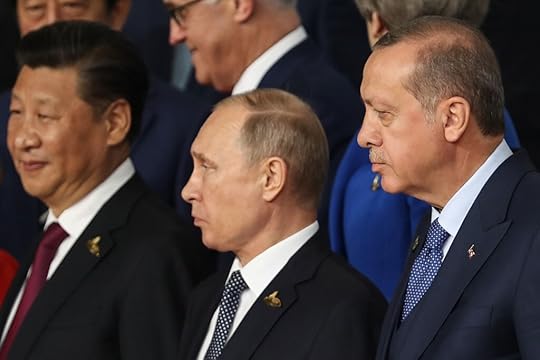How Autocracies Metastasized, Chapter 2, Autocracy, Inc.

From a Google Image Search – Politico
Let’s see what Anne Applebaum means when she compares the spread of autocracy and kleptocracy to the spread of a cancer. As Western nations try to influence nations that intimidate or use violence against their citizens – nations that give power to a few and squelch the human rights of many – by sanctioning them or their banks or institutions, autocratic leaders are creeping in to bypass these sanctions or boycotts. In a way Autocracy, Inc., if it existed as a formal global entity, would be an anti-NATO. These nations seek to undermine democracies and, if they succeed, they create new autocracies. The pilfering of national dollars can cause the nations they “protect” to fail without their assistance (sometimes even with their assistance). The lure of fortunes to be made and sequestered away is creating a pull towards autocracy in nations that are long-established democracies. This has us fearing that the balance of global power is shifting towards autocratic/kleptocratic governance and may give global hegemony to a giant autocracy like China, or a giant, ruthless autocracy like Russia. The 2024 election in America could weaken our democracy, perhaps beyond restoration, if Trump and the Republicans win.
Applebaum uses several examples to illustrate how Autocracy Inc., through mostly unplanned interventions, allows dysfunctional, pillaged national economies to continue to serve as fodder for kleptocrats. These rescuer nations may have once required no quid pro quos, but they have learned to profit as they preserve autocracies in trouble.
This article will summarize her discussion of this dynamic with one example in Venezuela, but there are more examples in Applebaum’s book. President Hugo Chavez rose to power in 1998. Venezuela was an oil state, “nepotistic and corrupt.” Politicians were bribed and deals were offered to friends of the former President. Chavez ran as a leader “who promised to create a more honest “Bavarian Republic of Venezuela”. But as corruption crept in Chavez did not pursue opportunities to end it, in fact he fired the whistleblower, a member of his inner circle. Chavez, like Putin, chose to turn Venezuela into a kleptocracy. “Corrupt officials prove more malleable than clean ones.” (p. 45)
Chavez eliminated transparency and accountability, he broke democratic institutions like the press, the courts, the civil service. (Sound familiar?) All the while he kept proclaiming his belief in democracy. Applebaum says, “since everyone was breaking the law no one wanted to talk about it.” Meanwhile, officials were hiding millions in oil money in a Portuguese Bank (Banco Espirito Santo). Ten billion dollars went into Swiss banks and 26 billion from a Venezuelan oil company scam was stashed in Andora Banks. A later investigation showed 127 cases of large-scale corruption just in the oil industry. (pg. 46)
A new form of corruption later named currency exchange manipulation offered a way to profit from skimming dollars and exploiting weak laws. For a while students figured out how to game the currency exchange system. It was called the “democratization of kleptocracy” Chavez was able to fool many for a while until the decline of the oil industry began in 2002-3.
“Billions (or maybe tens of billions) of state funds had vanished, the country’s foreign currency had disappeared into private offshore accounts, hyperinflation accelerated and imported goods vanished.” (p. 48-49)
Chavez died in 2013, and Venezuelans hoped the corruption would end when they elected Nicolás Maduro, but, Applebaum contends, “Autocracy Inc. stepped in to help.” Rogue states surviving under sanctions turned to new sources of funding. They turned to drug trafficking, illegal mining, extortion, kidnapping, and gasoline smuggling. She argues, “[i]f a state is a member of Autocracy Inc. there are other options.” (p. 50) There are friends and trading partners in other sanctioned states. There are companies that are unbothered by corruption – happy to encourage it and to participate in it.
Russian companies stepped in to replace North America, South America, and Europe. Rosneft, Gazprom, Lukoil, TNK-BP all put money into Venezuela. Grain imports from the US and Canada were replaced by Russia along with 4 billion in Russian weapons.
China started loaning money to Venezuela without conditions which bought Chavez and Maduro time before collapse. China eventually added conditions when Venezuela defaulted on the loans. China sold riot gear to the regimes.
Cuba was linked to Venezuela by an anti-American agenda. Oil moved from Venezuela to Cuba; soldiers, police officers, and security and intelligence experts moved from Cuba to Venezuela (to quell riots and demonstrations). Cuba taught Venezuela how to use food shortages to end dissent (think about it).
Turkey helped because of personal links between Erdogan and Maduro who were bonded by their dislike of democracy and its anti-corruption movements. Venezuela sent gold to Turkey in exchange for food.
Iran seemed the most improbable tie, Applebaum tells us. Oil binds them and anti-Americanism, opposition of democratic movements at home, trading information about how to evade sanctions. Iran got gold, Venezuela got food, gasoline and advice on the repression of dissidents. Iran helped Venezuela build a drone factory and sent money to be laundered for Hezbollah.
There are more examples in Chapter 2. More nations are involved. Applebaum says, “there are hybrid states that are a legitimate part of international financial systems, that normally trade with the democratic world, that are sometimes part of democratic military alliances but are also willing to launder or accept criminal or stolen wealth or to assist people and companies that have been sanctioned.” (p. 50)
My comments – Perhaps you have been very aware of the spread of autocracy and are not surprised by corruption, but it is important to note how autocratic nations are pitching in to get around sanctions that democracies use to try to enforce humanitarian standards both in peace and war. Will Autocracy Inc. become an institutionalized force against democracy instead of providing hit and run assistance to kleptocracies that go too far, whose economies fail, and who have sanctions against them? These nations deliberately try to exert power to prevent humanitarian reforms in the nations that may soon make up a true Autocracy Inc.



